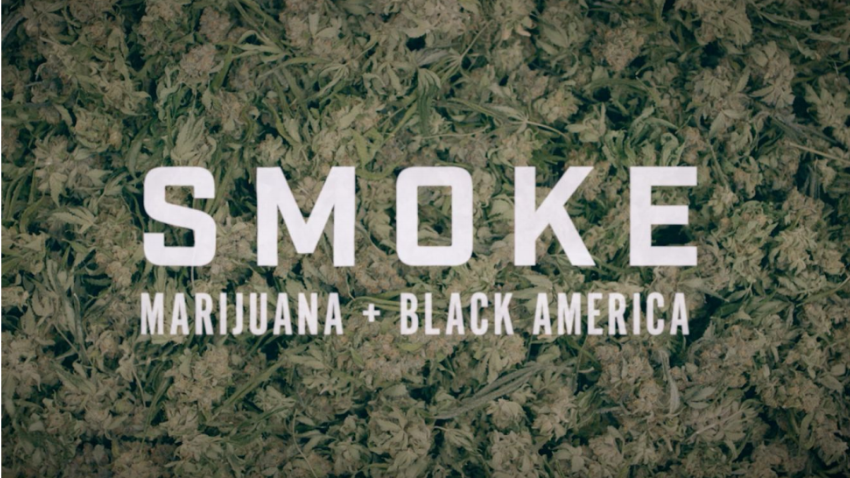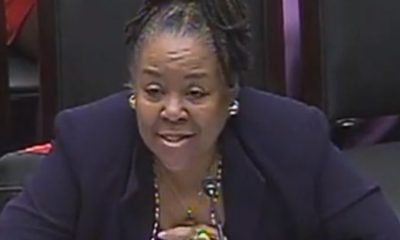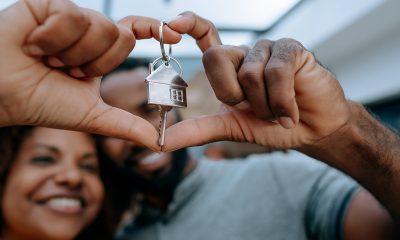#NNPA BlackPress
Review: BET Doc “Smoke: Marijuana and Black America”

I am a baby boomer and old school. I grew up thinking that smoking pot led to an addiction to worse drugs. I certainly had judgment about marijuana use and users regardless of whether it is legal.
BET presents a two-hour documentary, “Smoke: Marijuana and Black America” on November 18 at 10 pm ET/PT.
It will be available on BET Now App and BET.com on demand starting 11/19.
Nas narrates and executive produces.
“SMOKE” Features Sit-Down Interviews with Vice Presidential Elect Kamala Harris, Senator Cory Booker, Former NBA Player Al Harrington, Rapper B-Real of Cypress Hill, Singer/Producer Ty Dolla $ign, Son of Notorious B.I.G. and Faith Evans C.J. Wallace, Illinois Governor J.B. Pritzker, Cook County, Illinois State’s Attorney Kim Foxx, Representative Barbara Lee, WNBA Star Cheyenne Parker, Former NFL Player Ricky Williams and more.
[the two-hour special examines marijuana’s cultural, social, economic and legal impact on American society and the Black community. Told through the lens of aficionados, policymakers, advocates and innovators in the booming legal cannabis industry. . .”.
““SMOKE” traces the fascinating and complex legacy of marijuana in the Black community. Early usage was recreational in nature, but political and racial dynamics led to the criminalization of cannabis and eventually its prohibition. America’s unjust war on drugs systematically targeted marijuana use in the Black community, resulting in racially disproportionate numbers of arrests and convictions. ”
For me, like most documentaries, SMOKE, is educational and current. It has election information on our President-elect and Vice President-elect as well as four states that legalized marijuana during the 11/3/2020 election: New Jersey, Montana, Arizona, and South Dakota.
I remember when President Bill Clinton famously said that he didn’t inhale, but did not recall but was informed by the doc, that President Obama said: “I inhaled, that was the point.”
I didn’t know as the doc points out that 85% of the drug arrests are Black folks, 11 states have legalized marijuana, and Blacks are 4 times more likely to be arrested for marijuana conviction than any other racial group.
I was also unaware of the social equity and restorative justice implications of the legalization of marijuana and the cannabis business.
Black folks only own 4% of the cannabis industry, Brown folks, 7%. Less than 1% of the licenses go to Black and Brown folks.
Wanda James of simplypure.org says: “I would rather have a joint than a glass of wine.”
I highly recommend SMOKE, especially if you like me, did not understand the medical uses of marijuana and social equity and restorative justice implications.
#NNPA BlackPress
IN MEMORIAM: Ramona Edelin, Influential Activist and Education Advocate, Dies at 78
NNPA NEWSWIRE — Born on September 4, 1945, in Los Angeles, California, activist Ramona Edelin’s early years were marked by a commitment to education and social justice. According to her HistoryMakers biography, after graduating from Fisk University with a Bachelor’s degree in 1967, she pursued further studies at the University of East Anglia in England. She earned her master’s degree before completing her Ph.D. at Boston University in 1981.
The post IN MEMORIAM: Ramona Edelin, Influential Activist and Education Advocate, Dies at 78 first appeared on BlackPressUSA.

By Stacy M. Brown, NNPA Newswire Senior National Correspondent
@StacyBrownMedia
Once upon a time, Black Americans were simply known as colored people, or Negroes. That is until Ramona Edelin came along. The activist, renowned for her pivotal roles in advancing civil rights, education reform, and community empowerment, died at her D.C. residence last month at the age of 78. Her death, finally confirmed this week by Barnaby Towns, a communications strategist who collaborated with Dr. Edelin, was attributed to cancer.
Born on September 4, 1945, in Los Angeles, California, Edelin’s early years were marked by a commitment to education and social justice. According to her HistoryMakers biography, after graduating from Fisk University with a Bachelor’s degree in 1967, she pursued further studies at the University of East Anglia in England. She earned her master’s degree before completing her Ph.D. at Boston University in 1981.
Edelin’s contributions to academia and activism were manifold. She was pivotal in popularizing the term “African American” alongside Rev. Jesse L. Jackson in the late 1980s.
Jackson had announced the preference for “African American,” speaking for summit organizers that included Dr. Edelin. “Just as we were called Colored, but were not that, and then Negro, but not that, to be called Black is just as baseless,” he said, adding that “African American” “has cultural integrity” and “puts us in our proper historical context.”
Later, Edelin told Ebony magazine, “Calling ourselves African Americans is the first step in the cultural offensive,” while linking the name change to a “cultural renaissance” in which Black Americans reconnected with their history and heritage.
“Who are we if we don’t acknowledge our motherland?” she asked later. “When a child in a ghetto calls himself African American, immediately he’s international. You’ve taken him from the ghetto and put him on the globe.”
The HistoryMakers bio noted that Edelin’s academic pursuits led her to found and chair the Department of African American Studies at Northeastern University, where she established herself as a leading voice.
Transitioning from academia to advocacy, Edelin joined the National Urban Coalition in 1977, eventually ascending to president and CEO. During her tenure, she spearheaded initiatives such as the “Say Yes to a Youngster’s Future” program, which provided crucial support in math, science, and technology to youth and teachers of color in urban areas. Her biography noted that Edelin’s efforts extended nationwide through partnerships with organizations like the National Science Foundation and the United States Department of Education.
President Bill Clinton recognized Edelin’s expertise by appointing her to the Presidential Board on Historically Black Colleges and Universities in 1998. She also co-founded and served as treasurer of the Black Leadership Forum, solidifying her standing as a respected leader in African American communities.
Beyond her professional achievements, Edelin dedicated herself to numerous boards and committees, including chairing the District of Columbia Educational Goals 2000 Panel and contributing to the Federal Advisory Committee for the Black Community Crusade for Children.
Throughout her life, Edelin received widespread recognition for her contributions. Ebony magazine honored her as one of the 100 Most Influential Black Americans, and she received prestigious awards such as the Southern Christian Leadership Award for Progressive Leadership and the IBM Community Executive Program Award.
The post IN MEMORIAM: Ramona Edelin, Influential Activist and Education Advocate, Dies at 78 first appeared on BlackPressUSA.
#NNPA BlackPress
Tennessee State University Board Disbanded by MAGA Loyalists as Assault on DE&I Continues
NNPA NEWSWIRE — Recent legislative actions in Tennessee, such as repealing police reform measures enacted after the killing of Tyre Nichols, underscore a troubling trend of undermining local control and perpetuating racist agendas. The new law preventing local governments from restricting police officers’ authority disregards community efforts to address systemic issues of police violence and racial profiling.
The post Tennessee State University Board Disbanded by MAGA Loyalists as Assault on DE&I Continues first appeared on BlackPressUSA.

By Stacy M. Brown, NNPA Newswire Senior National Correspondent
@StacyBrownMedia
Tennessee State University (TSU), the state’s only public historically Black college and university (HBCU), faces a tumultuous future as Gov. Bill Lee dissolved its board, a move supported by racist conservatives and MAGA Republicans in the Tennessee General Assembly, who follow the lead of the twice-impeached, four-times indicted, alleged sexual predator former President Donald Trump. Educators and others have denounced the move as an attack on diversity, equity, and inclusion (DE&I) and a grave setback for higher education.
Critics argue that TSU’s purported financial mismanagement is a manufactured crisis rooted in decades of underinvestment by the state government. They’ve noted that it continues a trend by conservatives and the racist MAGA movement to eliminate opportunities for Blacks in education, corporate America, and the public sector.
Gevin Reynolds, a former speechwriter for Vice President Kamala Harris, emphasizes in an op-ed that TSU’s financial difficulties are not the result of university leadership because a recent audit found no evidence of fraud or malfeasance.
Reynolds noted that the disbanding of TSU’s board is not an isolated incident but part of a broader assault on DE&I initiatives nationwide. Ten states, including Tennessee, have enacted laws banning DE&I policies on college campuses, while governors appointing MAGA loyalists to university trustee positions further undermine efforts to promote inclusivity and equality.
Moreover, recent legislative actions in Tennessee, such as repealing police reform measures enacted after the killing of Tyre Nichols, underscore a troubling trend of undermining local control and perpetuating racist agendas. The new law preventing local governments from restricting police officers’ authority disregards community efforts to address systemic issues of police violence and racial profiling.
The actions echo historical efforts to suppress Black progress, reminiscent of the violent backlash against gains made during the Reconstruction era. President Joe Biden warned during an appearance in New York last month that Trump desires to bring the nation back to the 18th and 19th centuries – in other words, to see, among other things, African Americans back in the chains of slavery, women subservient to men without any say over their bodies, and all voting rights restricted to white men.
The parallels are stark, with white supremacist ideologies used to justify attacks on Black institutions and disenfranchise marginalized communities, Reynolds argued.
In response to these challenges, advocates stress the urgency of collective action to defend democracy and combat systemic racism. Understanding that attacks on institutions like TSU are symptomatic of broader threats to democratic norms, they call for increased civic engagement and voting at all levels of government.
The actions of people dedicated to upholding the principles of inclusivity, equity, and justice for all will determine the outcome of the ongoing fight for democracy, Reynolds noted. “We are in a war for our democracy, one whose outcome will be determined by every line on every ballot at every precinct,” he stated.
The post Tennessee State University Board Disbanded by MAGA Loyalists as Assault on DE&I Continues first appeared on BlackPressUSA.
#NNPA BlackPress
Braxton Haulcy and the Expansion of Walker|West Music Academy
May 24, 2023 – Walker West Music Academy gets an early start on expansion. Join us for a Wednesday episode of The …
The post Braxton Haulcy and the Expansion of Walker|West Music Academy first appeared on BlackPressUSA.

May 24, 2023 – Walker West Music Academy gets an early start on expansion. Join us for a Wednesday episode of The …
The post Braxton Haulcy and the Expansion of Walker|West Music Academy first appeared on BlackPressUSA.
-

 Activism4 weeks ago
Activism4 weeks agoOakland Post: Week of March 27 – April 2, 2024
-

 #NNPA BlackPress4 weeks ago
#NNPA BlackPress4 weeks agoBeloved Actor and Activist Louis Cameron Gossett Jr. Dies at 87
-

 Community1 week ago
Community1 week agoFinancial Assistance Bill for Descendants of Enslaved Persons to Help Them Purchase, Own, or Maintain a Home
-

 Activism3 weeks ago
Activism3 weeks agoOakland Post: Week of April 3 – 6, 2024
-

 Business1 week ago
Business1 week agoV.P. Kamala Harris: Americans With Criminal Records Will Soon Be Eligible for SBA Loans
-

 Activism2 weeks ago
Activism2 weeks agoOakland Post: Week of April 10 – 16, 2024
-

 Community1 week ago
Community1 week agoAG Bonta Says Oakland School Leaders Should Comply with State Laws to Avoid ‘Disparate Harm’ When Closing or Merging Schools
-

 Community6 days ago
Community6 days agoOakland WNBA Player to be Inducted Into Hall of Fame

























































